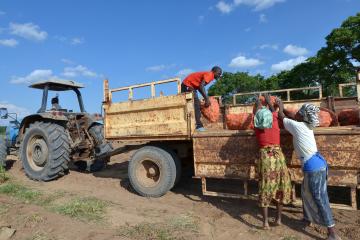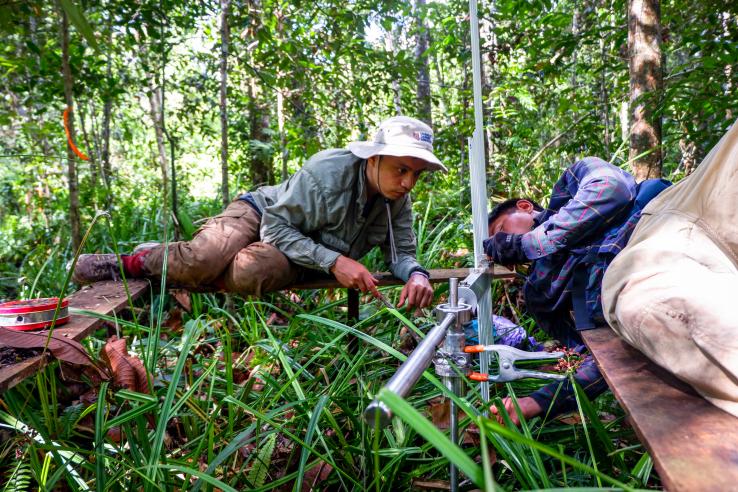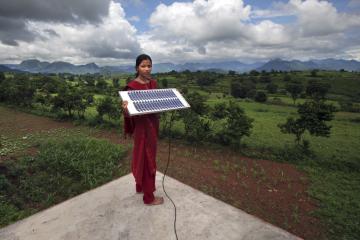
King Climate Action Initiative’s first round of projects: Testing and scaling climate solutions

Last week, the Biden administration took executive action to address climate change, including an order to promote evidence-informed decision making. This action signals a renewed vigor to fight the climate crisis from the United States, and there is hope for greater global cooperation and focus on scientific evidence.
Without urgent and collective efforts, the effects of climate change will be felt more deeply, particularly by people experiencing extreme poverty. Climate solutions need to not only reduce emissions and pollution but also address adaption and energy access challenges to protect the most vulnerable populations.
However, there is still a critical lack of research on the real-world impacts of climate solutions. Lab-generated evidence can fail to account for human behavior, such as imperfect implementation or low take-up. To ensure the most effective solutions are scaled, investments in real-world evaluations are crucial.
The King Climate Action Initiative (K-CAI) was launched in July 2020 to address this need for more rigorous research to combat climate change. With support from King Philanthropies, the $25 million initiative is dedicated to funding randomized evaluations that will generate rigorous evidence and catalyze the scale-up of effective climate policy and technology solutions.
K-CAI is among the first major climate change initiatives devoted to benefiting people experiencing poverty, generating evidence in real-world settings, and translating that evidence into large-scale action.
Funding projects across K-CAI’s four focus areas
K-CAI recently concluded its first funding competition and will support 14 projects in total, including 10 research projects and four scaling projects. These funded projects all fall within K-CAI’s four main focus areas: climate change mitigation, pollution reduction, adaption, and energy access.
Climate change mitigation
In order to mitigate the worst effects of climate change, we must significantly reduce global greenhouse gas (GHG) emissions. The adoption of innovative technologies or increased efficiencies can reduce industrial emission intensity and its harmful effects. One K-CAI-funded project by Robert Metcalfe, dedicated to reducing GHG emissions in the shipping industry, will evaluate whether changing management practices can increase fuel efficiency in the shipping industry.
There is also a significant opportunity to reduce emissions through conservation and avoided deforestation. Building evidence from previous a randomized evaluation on payments for ecosystem services (PES) in Uganda, a new K-CAI scale-up project by Seema Jayachandran, Santiago Izquierdo-Tort, and Santiago Saavedra aims to address funding constraints by piloting modifications to certain design features of Mexico’s PES program to increase the program’s cost-effectiveness.
Pollution reduction
Beyond GHG emissions, local pollutants, such as particulate matter, have harmful effects on health and productivity. Building on evidence from a 2019 evaluation in Gujarat, India, one new project by Michael Greenstone, Rohini Pande, Nick Ryan, and Anant Sudarshan will support regulators in piloting and scaling market-based schemes for air pollutants in Punjab and Gujarat. The goal of this effort is to reduce the emission of targeted air pollutants and the cost of compliance with environmental regulations.
Another pollution-focused project supported by the initiative by Douglas Almond and Shuang Zhang is leveraging data from continuous emissions monitoring systems in China to improve environmental inspections in China, with the aim of understanding if, when provided with better emissions data, environmental inspectors can impact enforcement and reduce industrial air pollution.
Climate change adaptation
Climate change is increasing the incidence of extreme weather events, from wildfires to hurricanes to droughts and floods. For low-income communities and countries, increasing resilience to extreme weather events is critical.
A new K-CAI-funded project by Rohini Pande and Maulik Jagnani aims to address this challenge through the first randomized evaluation of a flood early warning system in India, which will leverage forecasting and alerting systems and grassroots volunteers trained in community outreach. This will generate insights on how to disseminate time-sensitive forecasts that encourage behavior that protects individuals from flood risks, despite the high initial costs of those behaviors.
Energy access
As economies in low- and middle-income countries grow, so will energy demand. This is a current challenge the City of Cape Town in South Africa is facing.
Cape Town provides free basic electricity to low-income households and has committed to net carbon neutrality by 2050. The City must balance equitable growth goals with demand for utilities, but has limited tools at its disposal. A new scale-up project by Kelsey Jack will adapt existing evidence on targeting to improve the delivery of electricity subsidies to low-income households in Cape Town, building on existing long-term partnerships between J-PAL Africa, the principal investigator, and the City.
Next steps for climate solutions
Funding these projects is a critical first step in building a longer playbook of evidence-based and cost-effective climate change solutions focused on both mitigation and adaptation. K-CAI's first round of projects demonstrates that it is possible to rigorously evaluate climate policies in real-world settings with regulators, companies, and utilities and learn about program effectiveness as they take policy action.
These projects utilize an innovative combination of high- and low-tech solutions in order to adapt climate solutions to low- and middle-income country contexts. Not only is this technological innovation key, but their focus on enabling policies is equally important to ensuring solutions are both effective and equitable.
“Policy innovation and evaluation, just like technological innovation, is vital for confronting climate change. It can help build the case for policy action and ensure that good technologies achieve their ultimate goals,” said Claire Walsh, K-CAI Project Director.
By investing in evaluation to learn whether climate policies work, K-CAI can help ensure that emissions are successfully cut and help low-income communities adapt.
K-CAI’s efforts to combat climate change through research and policy change will continue. The initiative recently launched its second round of funding for Spring 2021, which will continue to fund projects that identify, generate, and scale cost-effective solutions across its four focus areas.
To stay up to date with environment, energy, and climate change research and related policy implications, subscribe to our mailing list and mark “Environment & Energy” as a sector interest area.



